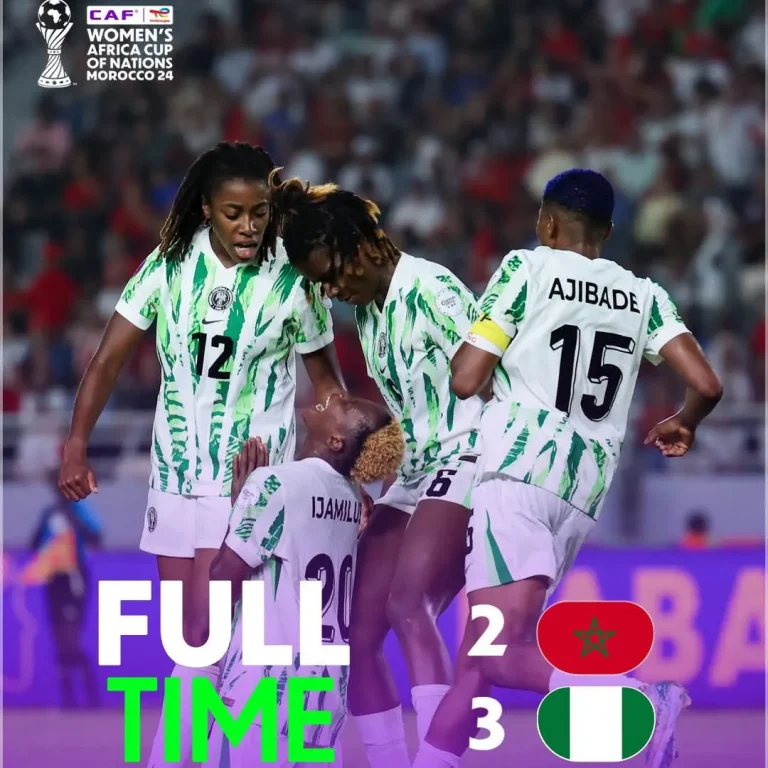In a dramatic twist of national pride and presidential flair, Nigeria’s Super Falcons have just received what might be the most generous sports reward in the country’s history—thanks to President Bola Ahmed Tinubu. According to a Daily Trust report, the team, fresh from their triumphant 10th Women’s Africa Cup of Nations (WAFCON) victory, has been showered with an astonishing ₦153 million (roughly $150,000) per player, a house each, and national honours to crown it all. It’s a grand gesture that has lit up conversations from barbershops to boardrooms, fueling both celebration and skepticism.
But beneath the surface of this national celebration lies a curious tension—one that blurs the line between admiration and envy. Many have questioned the intent behind such extravagant generosity. Is this truly about rewarding excellence, or a tactical move to dodge public backlash? In a country where recognition often lags far behind achievement, this dramatic presidential applause seems suspiciously like overcompensation. Perhaps, after years of downplaying the efforts of citizens who elevate the nation, the government feared missing the wave of emotion stirred by the Falcons’ breathtaking comeback from two goals down to defeat host nation Morocco 3–2. In a nation hungry for hope, this victory was more than a football match—it was a masterclass in resilience, a rare national high. And maybe the presidency just didn’t want to be seen as indifferent.
Interestingly, what has stirred even more debate is not the house or the honours—but the denomination. Dollars, not naira. In an economy where the local currency stumbles like a drunk on payday, the use of dollars instantly inflated the reward’s optics. What is $150,000 in the U.S. becomes a jaw-dropping ₦153 million in Nigeria. It’s not just a reward; it’s a statement about the economy itself. This disparity echoes loudly: a foreign currency has now become the measuring stick for value, status, and reward in a country with its own struggling legal tender. And this isn’t unique to sports. It’s the reason a junior staff abroad, flipping burgers or babysitting, can earn more than our most decorated academics when converted to naira.
When critics raised eyebrows, the presidency was quick to clap back. Presidential media adviser Bayo Onanuga made an intriguing comparison: if reality shows like Big Brother Naija can reward their winners with ₦150 million for entertaining Nigerians on television, why shouldn’t national heroes on the pitch receive even more? The logic may be controversial, but it’s not baseless. Society, not the government, sets the market value of fame, excellence, and entertainment. If Nigerians are willing to vote en masse, create social media storms, and emotionally invest in a housemate they’ve never met, it’s only fair that athletes who bring global glory should be honored with similar fervor.
Yet, this spotlight on sports rewards has reopened an old wound: the perceived neglect of academics and civil servants. Why should a footballer earn in one night what a professor may never see in a lifetime? But here’s the hard truth—this isn’t about fairness. It’s about demand, appeal, and emotion. The richest people in the world rarely come from academia. They come from sports, entertainment, entrepreneurship, innovation—fields that stir emotion, attract eyeballs, and create markets. You’ll find engineers, doctors, and lawyers competing on shows like Nigerian Idol not because they aren’t proud of their professions, but because the reality of reward is changing. The currency of the modern world is attention, and where attention goes, money flows.
It’s not Tinubu who made footballers richer than professors—it’s us. The fans. The followers. The consumers of content. The voters on talent shows. The social media tribes that make every Instagram post a payday. Companies sponsor these shows not out of philanthropy, but out of profit. Every vote, every share, every trending hashtag turns into revenue. That’s why they’ll write a ₦30 million cheque for a singer before they fund a medical research grant. It’s not a matter of value; it’s a matter of visibility.
Telecom innovations like WhatsApp or entertainment platforms like TikTok and Netflix have become essentials in daily life, not because governments imposed them, but because people adopted them. The same applies to sports and entertainment—they’ve become inseparable from identity. Professors and academics, as vital as they are, don’t have fan bases that crash the internet. They inspire respect, but not always economic power.
This national gesture to the Super Falcons, while grand, is a mirror to society’s evolving priorities. If it inspires even one young Nigerian to explore alternatives to government jobs, it’s done more than just offer applause—it’s opened a door. In a country where hundreds of thousands apply for civil service jobs with limited slots, redirecting energy toward innovation, creativity, and sports might be the lifeline we’ve ignored for too long. Perhaps this could begin to ease the desperation that fuels exam malpractice and cutthroat politics. Maybe, just maybe, we’ll start rewarding talent and passion over paper qualifications.
In the end, what we’re witnessing is not a failure of governance, but a reflection of societal taste. The government merely followed the applause. We—through our screens, our cheers, our trending hashtags—have made celebrities the gold standard of reward. A president can offer houses and cash, but it is the people who give status. It’s not Tinubu who made sports more lucrative than academia—it’s the crowd that pays attention.
And attention, in today’s economy, is priceless.
Muhammad can be reached at bagudumohammed15197@gmail.com and 07034943575


